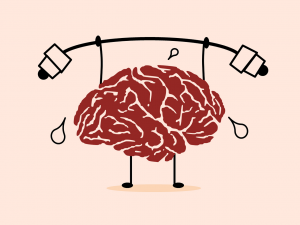Written by Manisha Raghavan, Bioengineering M.S. 2019
This is a personal story, but I am no longer ashamed to discuss it. If someone had asked me a year ago about how much attention I paid to my mental well being, I would have scoffed and told them that mental health is a ‘notion’ that doesn’t affect me. But once I got to grad school, my whole perspective on mental health changed.
Once the exciting ‘moved to a new country / I am an adult’ phase died down and grad school began to ramp up, things got harder. The stress of schoolwork, my new responsibilities, making new friends, and missing my loved ones back home — it all took a toll on me. I did not know what the feeling was exactly, or what the cause was, but I knew something was not right.
At first, I didn’t want to acknowledge my feelings. I pushed almost everyone away just because I saw them galavanting and enjoying life on social media. I felt so isolated; avoiding talking about how I felt because then I would have to face the reality of my situation.
After struggling alone, it took a lot of courage for me to go ahead and book an appointment with the Tufts Counseling and Mental Health Services. I started working with a counselor about my struggles, meeting expectations, a bad living situation, a project not taking off, racial microaggressions I faced, and anything else you could imagine. The last week of December, I remember my counselor telling me that I was suffering from depression and anxiety. I remember walking out of the center and crying inconsolably: it was my nightmare come true. But far from being a nightmare, working with my counselor has been extremely helpful for my mental health and well being.
I still go to therapy for my depression and anxiety, and there have been days when everything feels bad and I experience sadness on a consistent basis. But even when your body aches and you don’t feel like stepping out of bed, remember that it gets better—and I would know.
It took me time to realize that many students go through the same thing I do, but it can be much harder for grad students to talk about their mental health because we are expected to be “adults” on campus. I think the first important step that helped me was talking to my family and friends about how I was feeling. You would be surprised how many friends of mine were going through the same thing, on and off campus. Many of us were afraid of being judged, but I found that I got more support from my friends than I was expecting. One major resource on campus that helped me is Tufts Counseling and Mental Health Services. If you have paid the Tufts Health Fee, please do not hold back from visiting a counselor. They are trained, experienced professionals who are here to help you. If you have a mental health emergency, or if you are looking for a certain kind of support, Tufts Counseling and Mental Health Services can help.
If you feel that going and meeting someone in person is intimidating, you can use ‘BetterHelp’ and ‘iHope,’ both of which are valuable Telehealth counseling services. BetterHelp is covered by the Tufts student insurance plan, while iHope requires a copay. Tufts also has a wonderful service in the form of ‘Tufts Ears for Peers’ which is an anonymous, confidential helpline for Tufts students and is open from 7pm to 7am every day.
There are also many daily activities that can help with regular mental health support. You can also download apps such as ‘Headspace’, ‘Fabulous,’ and ‘Youper’ which force you to do regular emotional check-ins. Mindfulness meditation has been shown to control anxiety and panic attacks — just breathing in and breathing out with constant awareness can be a powerful tool. Pick up a new hobby, or an activity which you have put off for a long time. Get enough sleep and maintain a good diet. Start practicing ‘gratitude journaling’, and write down your negative thoughts. Let it out of your system.
But most importantly, let yourself feel the way you do. Many of us bottle up our emotions and feelings because we fear of being perceived as weak. Sometimes, all you need is an ear to listen to you, and a shoulder to lean on. No one has it easy in life, and some of us find it harder to cope than others. But remember to remind yourself that ‘after a hurricane, comes a rainbow’.

